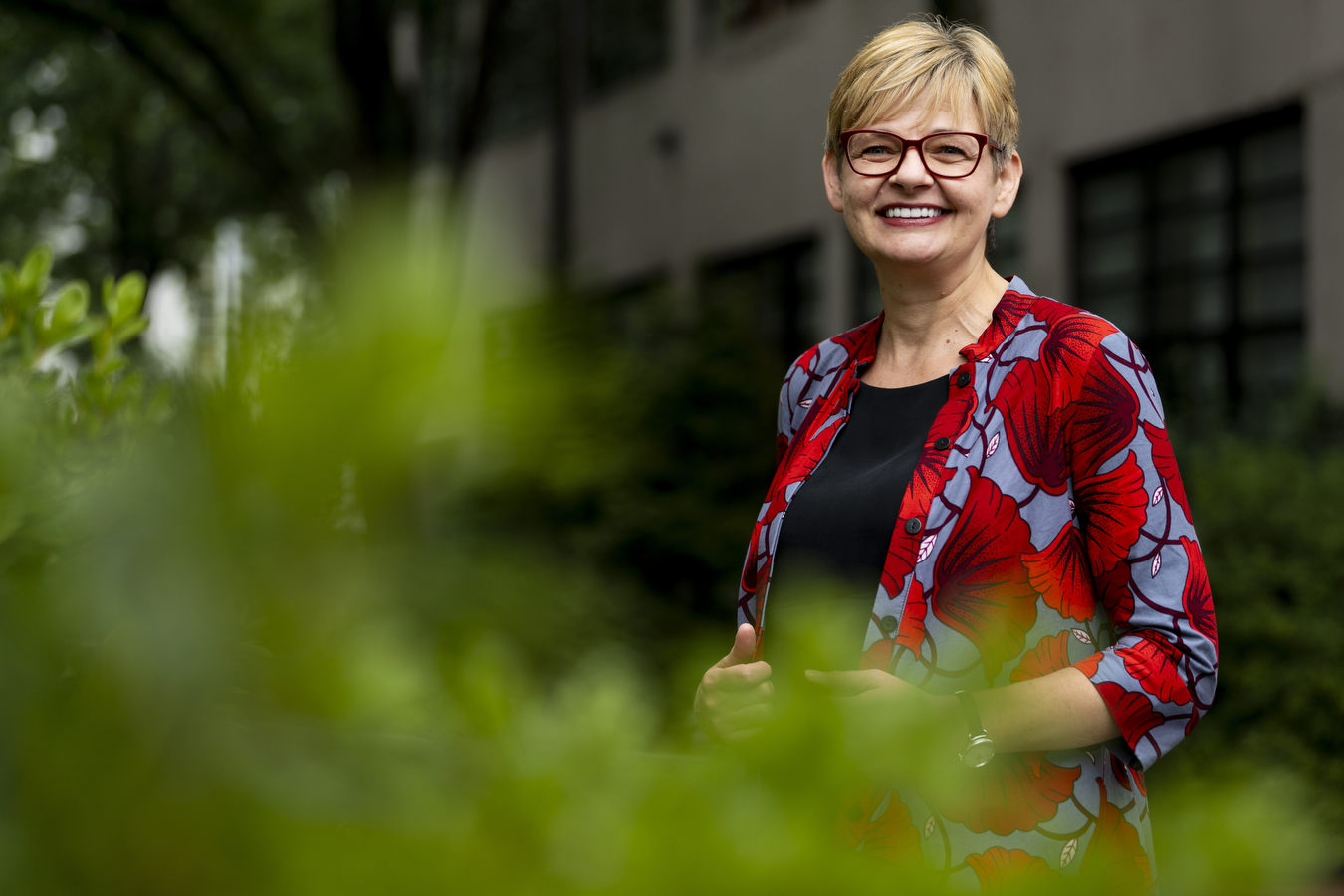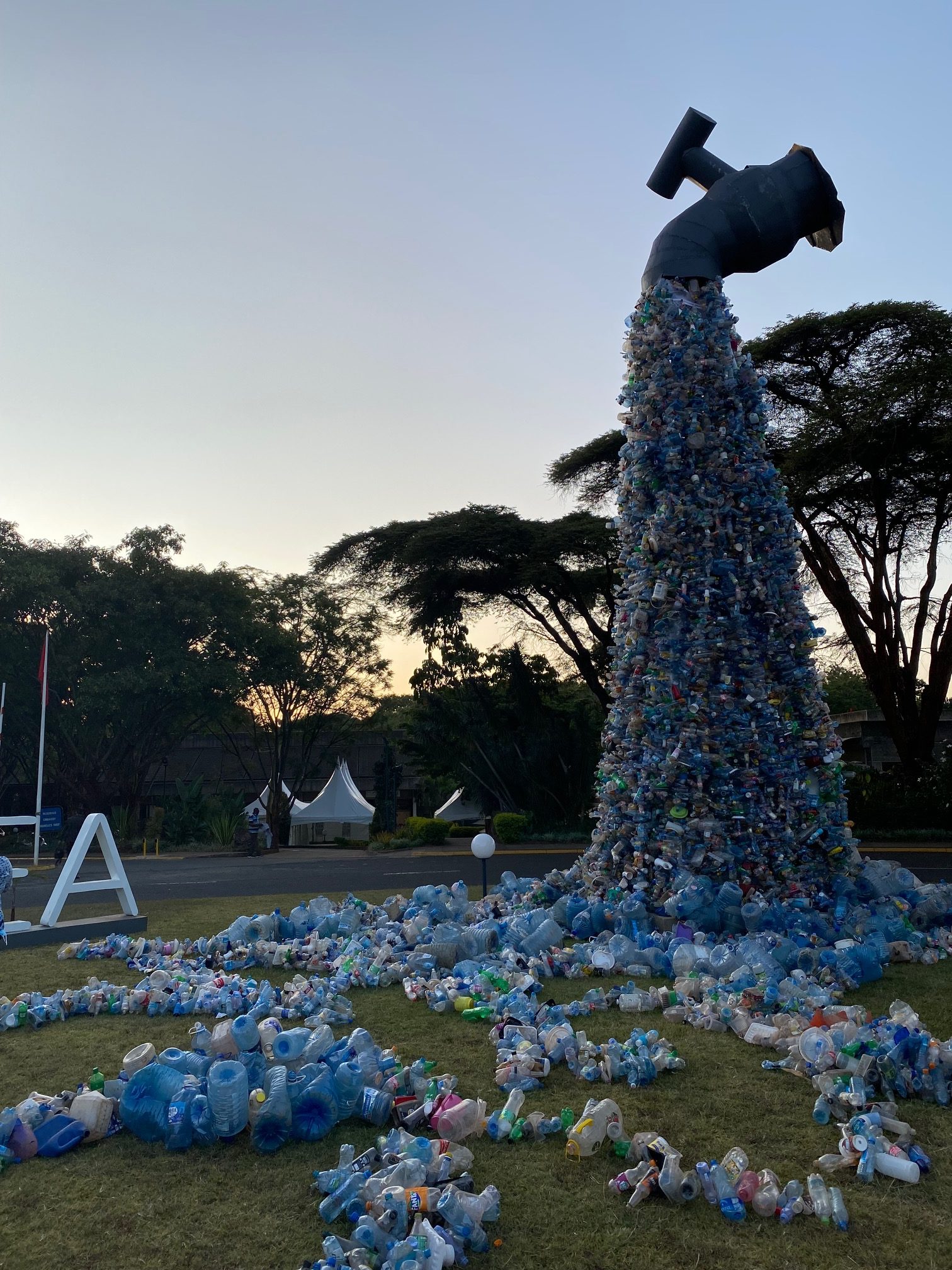New Northeastern public policy leader playing key role in treaty to end global plastic pollution

Maria Ivanova, Northeastern’s new director of the School of Public Policy and Urban Affairs, wants a future in which her students and their children aren’t mired in plastic products and refuse.
As a member of the Rwanda delegation to the United Nations Environment Assembly, she is helping move the world in that direction.
In March, representatives from 175 countries meeting in Nairobi, Kenya, passed a resolution to start negotiations on a historic, legally binding, cradle-to-grave international treaty to end plastic pollution by 2040.
Ivanova, who traveled to Nairobi as part of the Rwanda delegation that successfully advocated for the resolution, says the treaty would rival the Paris Agreement and Montreal Protocol in environmental importance.
“This is the next big thing in global environmental (protection),” Ivanova says. “This is significant.”
Plastic is found in everything from grocery bags and utensils to car parts and food containers, among thousands of other objects. Sometimes it seems the synthetic product threatens to take over the planet.

About 9.2 billion tons of plastic waste have been created since 1950, of which less than 10% has been recycled, according to the U.N.
And the problem is only getting worse, Ivanova says. “Plastic pollution and production are slated to increase dramatically by 2060. This is in the lifetime of our students,” she says.
In November, she plans to travel to Punta del Este, Uruguay with the Rwanda delegation for the first official negotiations on the treaty, which is slated to be adopted in 2024.
Ivanova, who says she was the only academic official to serve on a U.N. Environment Assembly delegation in March, credits Rwanda and also Peru for taking a leadership role in advocating for an ambitious international approach to handling the plastics pollution crisis.
“Two small states pushed the agenda forward.,” Ivanova says.
She says landlocked Rwanda helped shift the discussion from a sole focus on the tragedy of plastic debris in oceans and rivers to include the entire environment of the planet.
“This is a problem across many countries, across the world.”
Rwanda has taken strides to reversing its plastic pollution problem, banning plastic bags in 2008 and single-use plastic in 2019.
But it’s not enough, says Jeanne d’Arc Mujawamariya, minister of the environment for the Republic of Rwanda.
“Unfortunately, plastic wastes are still visible in the country’s downstream which proves the need of global efforts towards a common goal of ending plastic pollution because this an unacceptable burden to place on future generations,” she states on a Rwandan government website.
“Downstream is wherever the river takes it or wherever the wind takes it,” Ivanova says.
Rwanda has joined with Norway to launch a High Ambition Coalition that will work with other nations to advance work on the international agreement to end plastic pollution.
Allowing the crisis to continue will result in “perverse multiple negative consequences,” says Manuel Pulgar-Vidal, Peru’s former minister of the environment, currently global leader of climate and energy at the World Wildlife Fund.
“When it’s combined with climate change, it can move ecosystems and environmental conditions into a no return tipping point,” Pulgar-Vidal says in an email.




“A good example of that is ocean acidification,” he says. Research by the University of Plymouth in 2020 showed that some bacterial species that potentially cause coral reef disease thrive in conditions where they are exposed to plastics and ocean acidification.
The treaty will address the life cycle of plastics, from production and use to recycling, Ivanova says. The goal is to create alternative products, much as the successful Montreal Protocol resulted in the creation of refrigerants and sprays that are less harmful to the environment in order to protect the ozone layer.
The fact the proposed treaty is legally binding creates a level playing field for companies and corporations, who will all face the same restrictions and demands for innovative products, Ivanova says.
She says she sees a role for scientists and students at Northeastern University in developing alternative products that have similar performance but fewer long-lasting chemicals than today’s plastic products.
“They don’t degrade for a thousand years. They just never go away. Micro plastics have been found in human blood, human placenta. We don’t know what that does to human health, to our well being and even our survival,” she says.
“We here at Northeastern excel in science. Let’s think of different production methods.”
Ivanova said she also wants Northeastern to be seen as a place where people go for enhanced public policy discussions, particularly discussions concerning scientific and environmental issues.
The author of a recent book, “The Untold Story of the World’s Leading Environmental Institution: UNEP at Fifty,” Ivanova says she is excited to take on a public policy leadership role at Northeastern’s College of Social Sciences and Humanities.
The recipient of a $500,000 Carnegie Corporation grant to reimagine environmental multilateralism to advance small states diplomacy, Ivanova said she anticipates working with Northeastern students, staff and researchers to explore how multilateral approaches can tackle big global problems and create new paradigms.
“What I bring to Northeastern is that global connection,” Ivanova says.
“We can produce new products but we can also shift policy and societal attitudes. What drives this institution is real world impact.”
The involvement of Rwanda and Peru in the plastic crisis treaty process and of the Marshall Islands in the run up to the Paris Agreement on climate change shows small states can play an outsize role in protecting the environment, Ivanova says.
“We all assume, ‘Let the big guys deal with it,’” she says. But “small states punch above their weight. They have moral authority.”
For media inquiries, please contact media@northeastern.edu.






